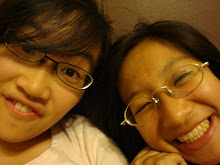 Whether clad in striped pajamas or a Donald Duck costume, whether lounging on the couch or perched on the dining room table, my mom is constantly prepared for battle. For while some choose to tackle countries or social institutions, her battle is with any cockroach, mosquito, and ant foolhardy enough to set an abdomen in her path. Usually this means the pests that inhabit this cauliflower-colored, 20 sq. ft. space we call home, and when the slipper smacks and the flyswatter sounds, the rest of us scramble to stay out of the way .
Whether clad in striped pajamas or a Donald Duck costume, whether lounging on the couch or perched on the dining room table, my mom is constantly prepared for battle. For while some choose to tackle countries or social institutions, her battle is with any cockroach, mosquito, and ant foolhardy enough to set an abdomen in her path. Usually this means the pests that inhabit this cauliflower-colored, 20 sq. ft. space we call home, and when the slipper smacks and the flyswatter sounds, the rest of us scramble to stay out of the way .Though sounds of falling furniture or slamming bathroom doors have come to signal scrimmages in this ongoing war, most of my mom's work is done stealthily, in the hours after bedtime. It is not until I have woken in the morning that I learn of the mosquito that persisted in buzzing in her ear until she smashed it with my copy of To Kill a Mockingbird at 3 AM, or the cockroach my mom ended up tearing in half (armed with tissues, she assured me) to ensure it would not revive (something, she also assured me, cockroaches are known to do). She recounts these campaigns with the pride of a seasoned general recalling battles hard won, and though her accounts involve discovering caterpillars in the vegetables and laying siege to ant colonies, they impress me more than any war story ever could. While I cannot understand battle tactics or army formations, I do understand the horror of stepping over a dried orange peel and realizing that it has legs and has begun scuttling across the floor, or the disappointment of uncovering the fruit tart you've been saving for days only to find that ants have nibbled their way through it.
But for somehow to devotes so much of her free time to wrangling with creepy crawlies underneath the refrigerator, my mom also seems to feel a strange affinity for these intruders. After once discovering an entire cockroach casting balanced on an orange in our pantry, she decided to mount the display, exoskeleton and all, on our kitchen shelf. She inspected it, admired it, gloated over it, and pointed it out to visitors as though it were an art exhibit. The cockroach casting remained there for days until we coaxed her to discard it with promises of a newfangled mosquito zapper.












